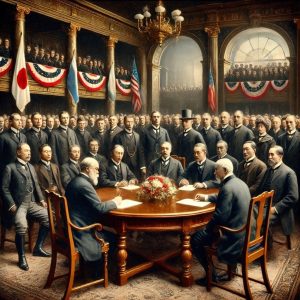In the early 20th century, the world witnessed a clash between two rising empires, Russia and Japan, in what became known as the Russo-Japanese War. This conflict, fought over control of Korea and Manchuria, signaled a power struggle that would change the balance of power in East Asia and the world. The war, fought from 1904 to 1905, was brought to an end not on the battlefield, but through diplomacy. The Treaty of Portsmouth, signed in September 1905, became the key to resolving this conflict, but its implications rippled far beyond the two warring nations.
The Rise of Japan and Decline of Russia
Japan, a nation that had rapidly modernized following the Meiji Restoration, had begun to assert itself as a major power in East Asia. It was eager to expand its influence, particularly in Korea and China, regions where Russia was also vying for control. The Russo-Japanese War erupted as the two nations clashed over territorial ambitions, with Japan launching a surprise attack on the Russian fleet in Port Arthur. To the surprise of many in the West, Japan proved a formidable opponent, winning decisive victories both at sea and on land.
Russia, meanwhile, struggled with internal unrest and logistical challenges, which hampered its ability to fight effectively. As the war dragged on, both sides grew weary, and the cost of the conflict became too great to bear. It was clear that the war could not continue indefinitely, and diplomacy was the only viable solution.
Diplomacy at Portsmouth
President Theodore Roosevelt of the United States, seeing an opportunity to mediate between the two powers, invited representatives from both nations to Portsmouth, New Hampshire. The negotiations were tense, with neither side willing to give up their ambitions easily. However, under Roosevelt’s guidance, a compromise was reached. Japan would gain control of Korea and parts of Manchuria, while Russia would retain influence in northern Manchuria but cede Port Arthur and the southern half of Sakhalin Island.
The Treaty of Portsmouth marked the end of the Russo-Japanese War and established Japan as a dominant force in East Asia, while Russia’s defeat weakened its influence in the region. More importantly, it was the first time an Asian power had defeated a European nation in modern warfare, a development that shocked the global community and shifted perceptions of racial and national hierarchies.
Global Impact and Legacy
The Treaty of Portsmouth had far-reaching consequences. Japan’s victory inspired nationalist movements across Asia, as colonized peoples saw that a non-Western nation could challenge and defeat a European power. It also laid the groundwork for Japan’s later expansionist policies, which would ultimately lead to its involvement in World War II.
For Russia, the defeat contributed to growing domestic unrest, which would culminate in the Russian Revolution of 1917. The Treaty of Portsmouth was a turning point in global geopolitics, symbolizing the rise of Japan as a world power and the beginning of the end for the old European-dominated world order.
Roosevelt’s role in mediating the treaty earned him the Nobel Peace Prize, marking the first time a U.S. president received the honor. The Portsmouth agreement thus not only ended a war but also showcased the growing influence of the United States in international diplomacy.
In retrospect, the Treaty of Portsmouth was not just a resolution to a regional conflict; it was a moment that reshaped global power dynamics and heralded the emergence of new players on the world stage. It remains a testament to the power of diplomacy in resolving even the most intense of conflicts.

